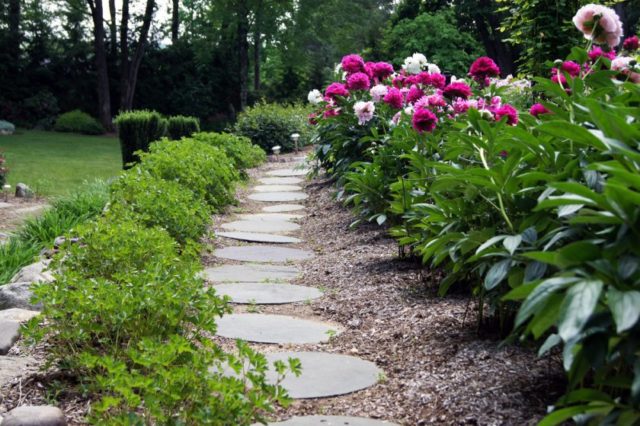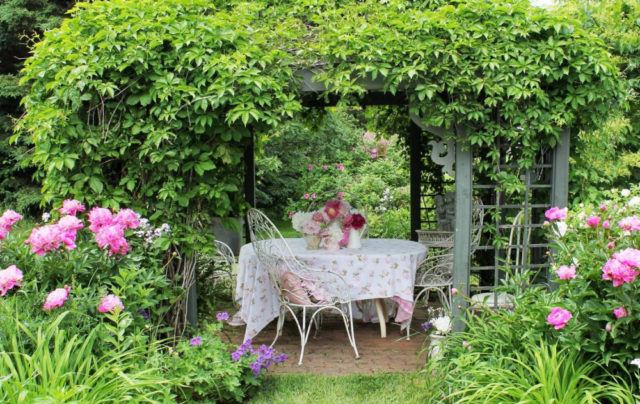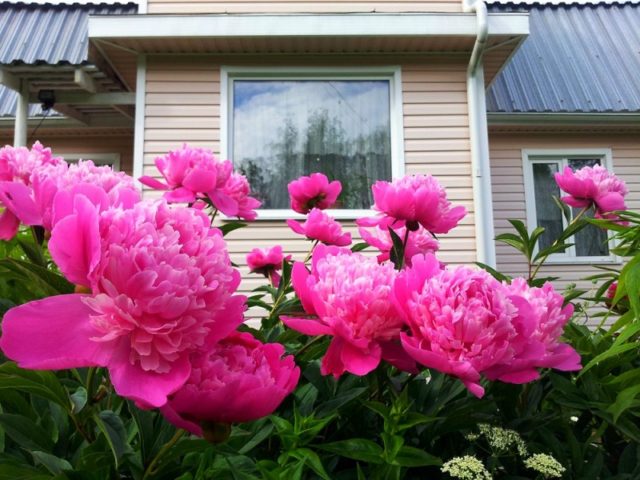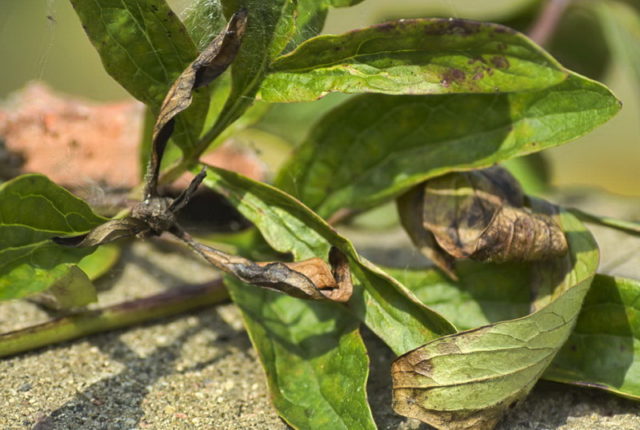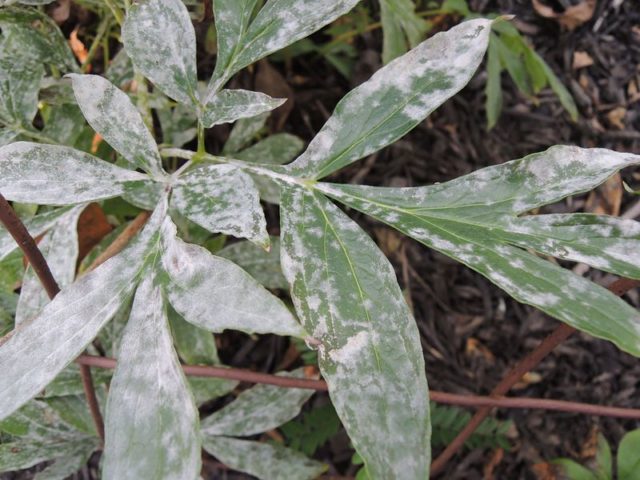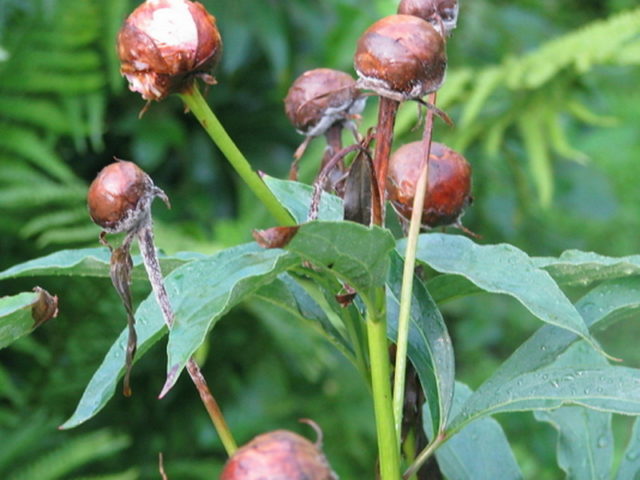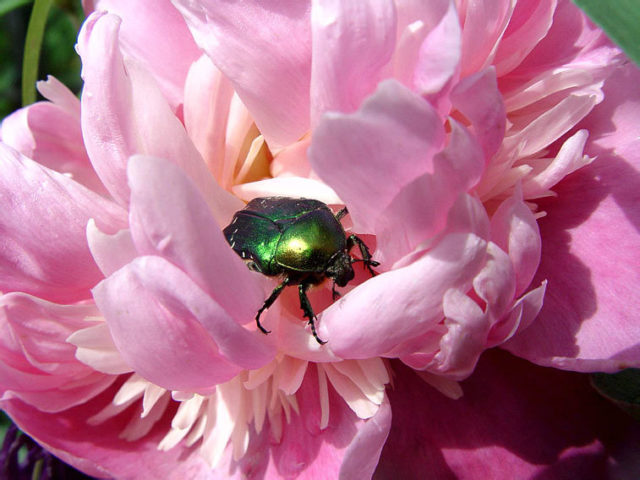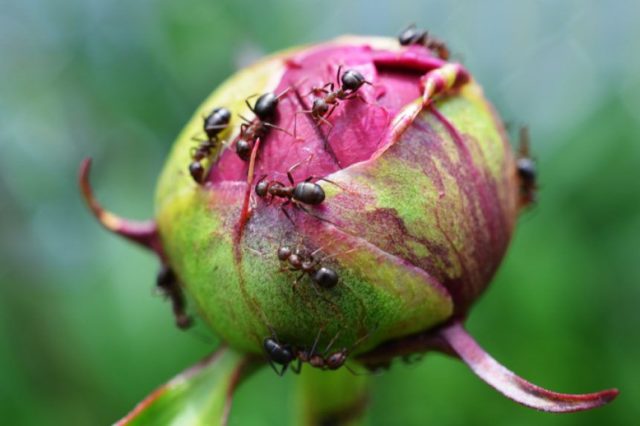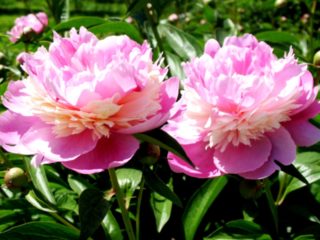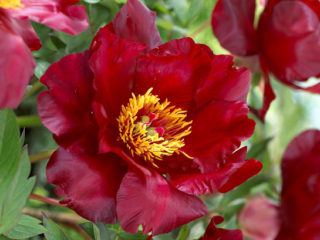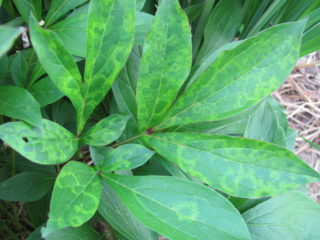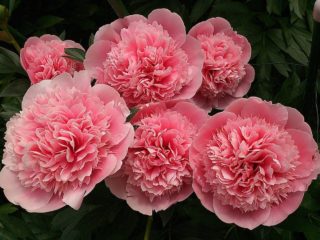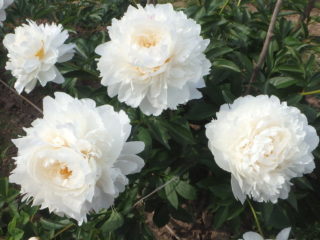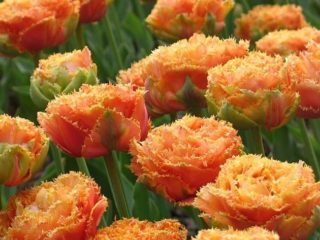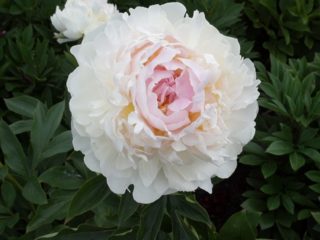Content
- 1 Benefits of growing pink peonies
- 2 The best varieties of pink peonies
- 2.1 pink cloud
- 2.2 Susie Q
- 2.3 Pink Double
- 2.4 Pink Formal
- 2.5 Peach under the snow
- 2.6 August Dessert
- 2.7 Florence
- 2.8 Pink Lemonade
- 2.9 Karl Rosenfeld
- 2.10 Rose Garden
- 2.11 Felix Supreme
- 2.12 Julia Rose
- 2.13 Celebrity
- 2.14 Pink Vanguard
- 2.15 Sorbet
- 2.16 Raspberry Sunday
- 2.17 Princess Margaret
- 2.18 Pearl placer
- 2.19 Nancy Nora
- 2.20 Pink Delight
- 2.21 Bowl of Beauty
- 3 Pink peonies in landscape design
- 4 Rules for planting and care
- 5 Diseases and pests
- 6 Conclusion
Pink peonies are a popular ornamental crop with many varieties. Flowers can be large and small, double and semi-double, dark and light; the choice for a gardener is practically unlimited.
Benefits of growing pink peonies
Pink peonies are attracting increased interest for a reason. Their advantages include:
- abundant and bright flowering from early to mid-summer, perennials become an adornment to any composition;
- unpretentiousness to growing conditions, flowers are cold-resistant and do not require special care;
- ease of propagation, the culture responds well to cuttings and division, so it is not necessary to buy new seedlings.
The best varieties of pink peonies
The perennial plant is represented by dozens of different varieties. Among them are the most popular and beloved by gardeners.
pink cloud
Chinese white and pink peony is also found under the name Zhong Sheng Feng. As an adult, it grows up to 90 cm above the ground and blooms at the end of June with large, delicate flowers, almost snow-white closer to the edges. Bears up to 5 buds on each stem and emits a pleasant light aroma.
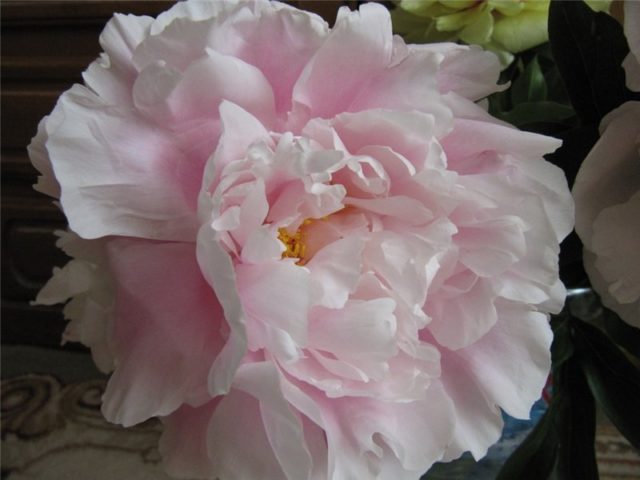
Peony Pink Cloud can withstand frosts down to - 40 ° C
Susie Q
The pink double peony Susie Q rises to 70 cm and blooms in mid-June. The buds of the variety are spherical, large, and bright in color. The strong stems hold the flowers well and do not break, but may droop slightly under their weight.
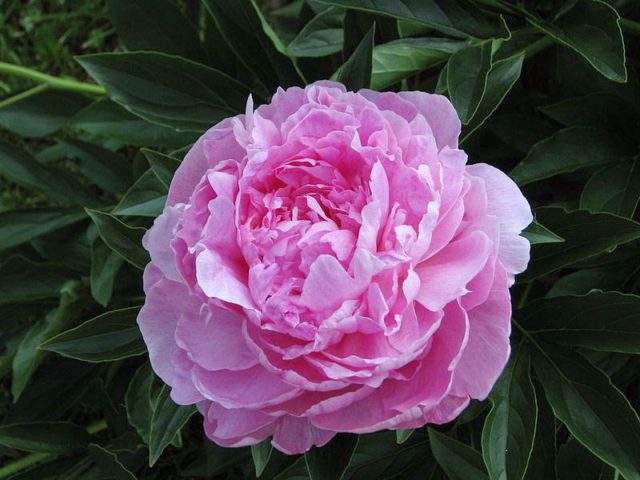
Susie Q's pink flowers can reach 17 cm
Pink Double
The Pink Double Dandy variety is a hybrid and combines the advantages of tree and herbaceous varieties. The stems of the plant are tall, up to 60 cm, the double flowers are dark at first, and then lighten a little. The photo of a pale pink peony clearly shows the bright golden stamens in the center. The variety blooms in mid-June and can remain attractive for about 3 weeks.
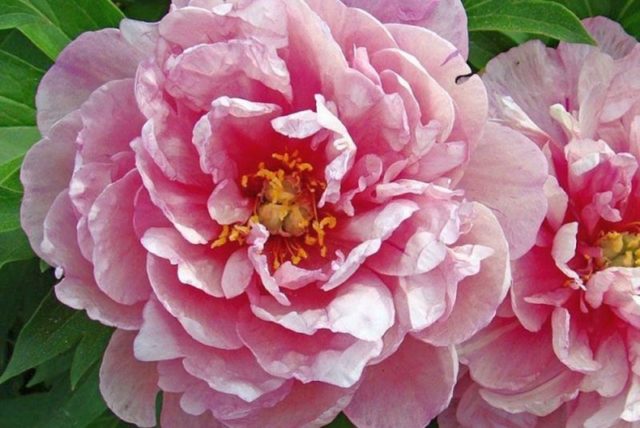
2-3 flowers may appear on Pink Double stems
Pink Formal
Compact terry type up to 65 cm tall. The Pink Formal variety blooms in the middle period, bearing very large buds up to 20 cm in diameter, pale pink with a darker lilac center, on the 15th-20th of June.
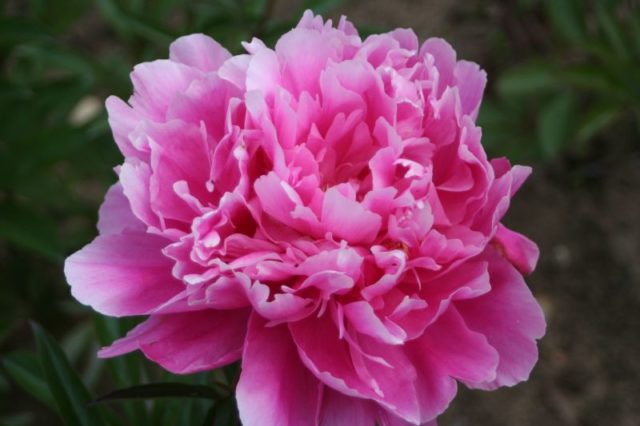
Pink Formal is distinguished by its neat shapes and strong peduncles.
Peach under the snow
The variety can be found under the names Xue Ying Tao Hua or Peachblossom Covered with Snow. The plant is considered one of the most beautiful in the group.Its buds are snow-white at the edges, but closer to the center they turn pink and gradually gain color saturation. It blooms towards mid-June and blooms very brightly and profusely.
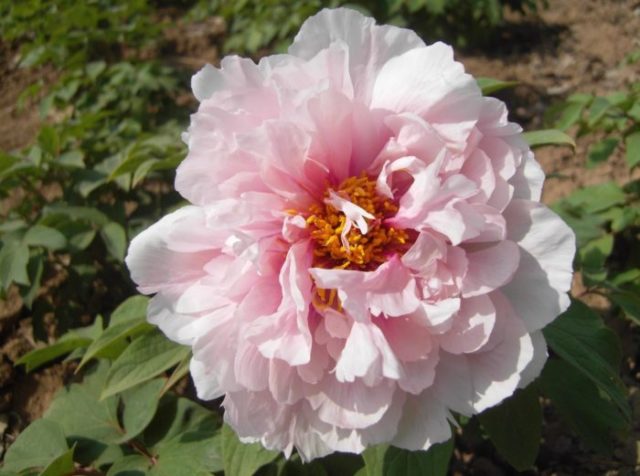
The height of a Peach under the snow can reach 2 m
August Dessert
The Auguste Dessert variety blooms in late June and bears deep pink flowers with a narrow white border around the edge of the petals. It grows up to 120 cm in height, holds inflorescences well on the stems and does not droop. It is frost-resistant and survives drought well; it does not fade for a long time after cutting.
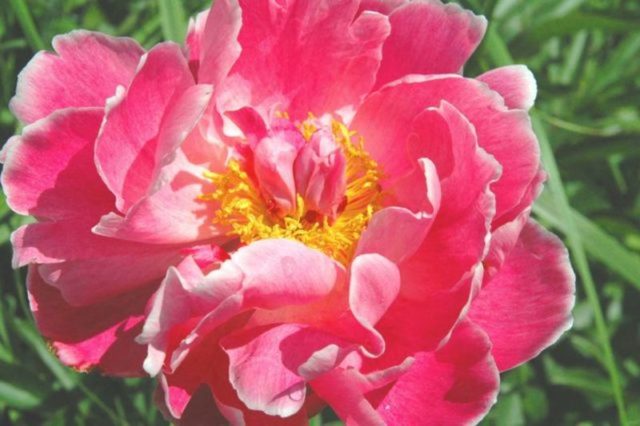
Pink peony August Dessert prefers to grow in sun or partial shade
Florence
The variety Florence Nicholls, or Florence Nicholls, grows up to 80 cm and is distinguished by its compact bush shape. A photo of a pale pink peony shows that its buds are almost white, terry and quite large. The variety reaches its maximum decorative value at the end of June, emits a pleasant aroma and lasts a long time in a vase after cutting.
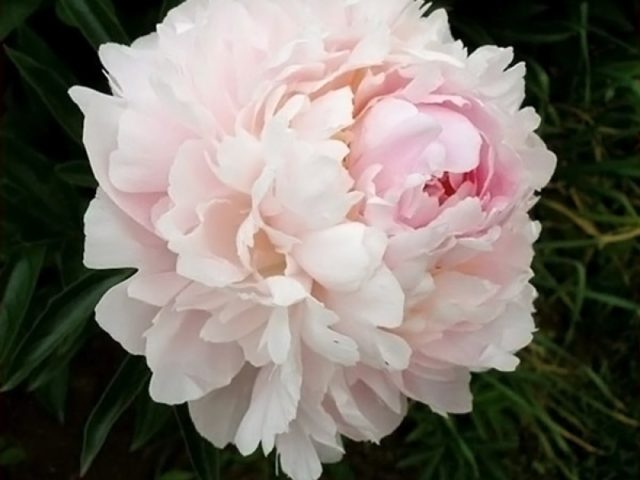
Florence's pink tint is very light
Pink Lemonade
The variety Pink Lemonade, or Pink Lemonade, blooms with beautiful coral-pink buds with a “fluffy” yellowish center, consisting of abundant long staminodes. It grows up to 80 cm, the flowers are large, but the bush does not droop under their weight. The variety blooms around June 20 and remains decorative for about 3 weeks.

What attracts special attention to Pink Lemonade flowers is their unusual core.
Karl Rosenfeld
The Karl Rosenfield variety with very bright pink-raspberry buds comes into full decorative form after June 25. The diameter of the flowers can reach 20 cm, and the bush itself rises an average of 85 cm.
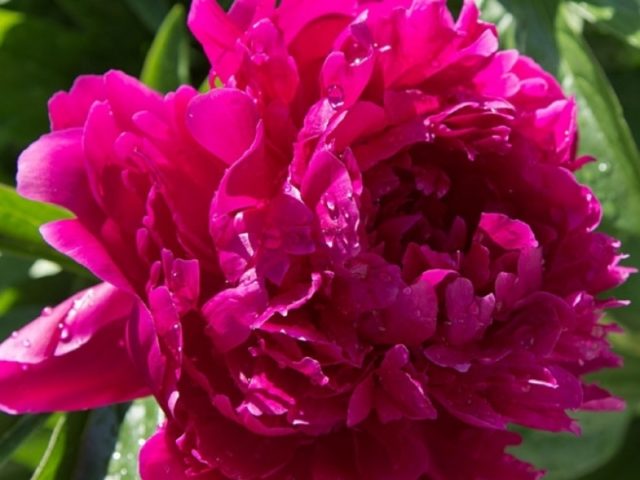
Karl Rosenfeld is a frost-resistant variety that can winter without special shelter
Rose Garden
Zhao yuan fen, or Rose Garden, is a beautiful perennial plant up to 90 cm tall. The flowers of the variety are spherical, of a very delicate shade. In the photo of the white and pink peony they look like airy clouds. It blooms late, in early July, and can decorate the garden until August. The buds of the plant are medium in size, up to 13 cm, but appear on the bushes very abundantly.
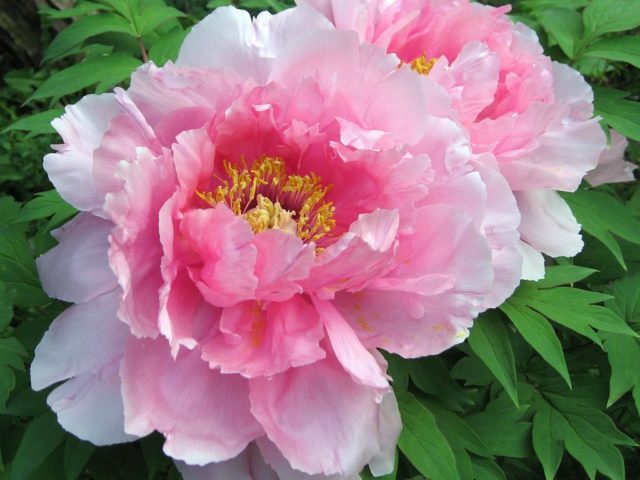
Delicate peony flowers Rose Garden look contrasting against the background of rich green foliage
Felix Supreme
Felix Supreme bears ruby-pink dense buds up to 17 cm wide. It emits a strong rosehip aroma, rises 90 cm in height and spreads widely. Flowering occurs in early June and can be very abundant with good care.
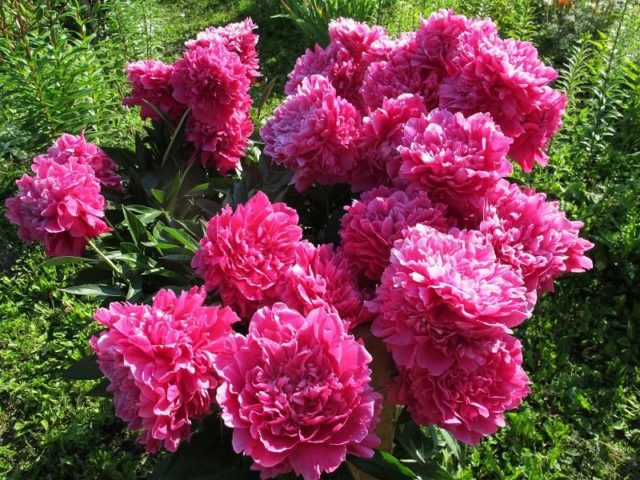
Felix Supreme stems may droop slightly under the weight of spherical flowers
Julia Rose
The semi-double variety Julia Rose is a tall hybrid and rises 90 cm above ground level. The buds are large, at first raspberry-pink, then lighter, and towards the end of flowering - peach-yellow. The decorative period begins very early, at the end of May or early June, and the variety retains its attractiveness until July.
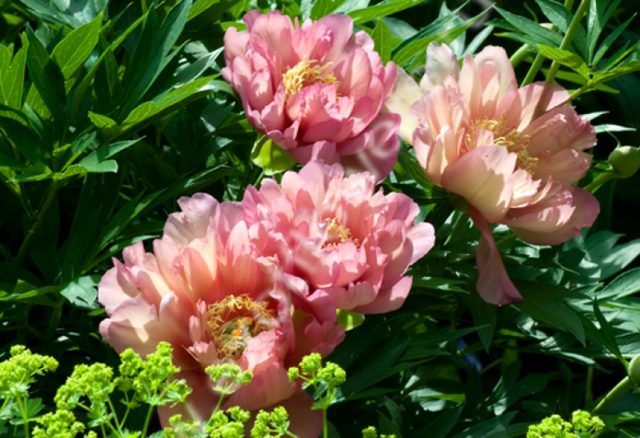
In the center of the Julia Rose buds are dense yellow staminodes.
Celebrity
The Celebrity peony blooms in early June with beautiful pink-raspberry buds with white splashes. The height of the bush is 95 cm. The plant is frost-resistant and does not fade for a long time. In autumn, the green carved leaves turn purple, so even after flowering has ended, the perennial remains decorative.
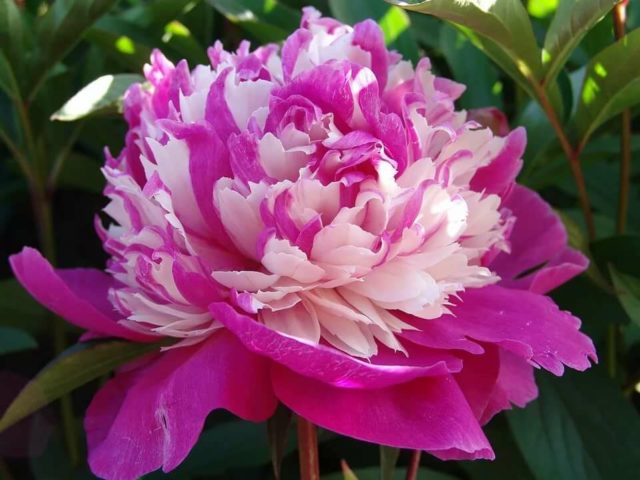
In the Celebrity garden it blooms for about 20 days
Pink Vanguard
The tall peony Pink Vanguard, or Pink Vanguard, grows up to 1 m above the ground and bears large buds of a soft pink hue in mid-June.During flowering, it lightens a little, and the petals at the base become reddish. It retains its decorative effect for a long time due to the side buds on the stem, does not droop or break.
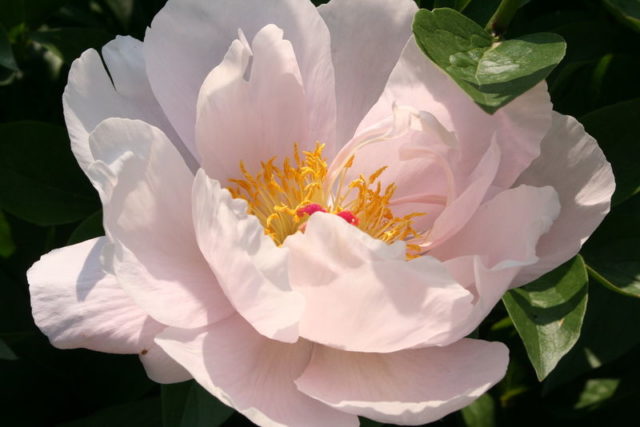
Bright yellow stamens are visible in the core of Pink Vanguard
Sorbet
The medium-growing variety Sorbet reaches 70 cm, produces large buds with a creamy-white layer in the middle. In appearance, Sorbet resembles an oriental sweetness; during flowering it emits a light aroma. The creamy pink peony blooms in early summer and can remain attractive for a month.
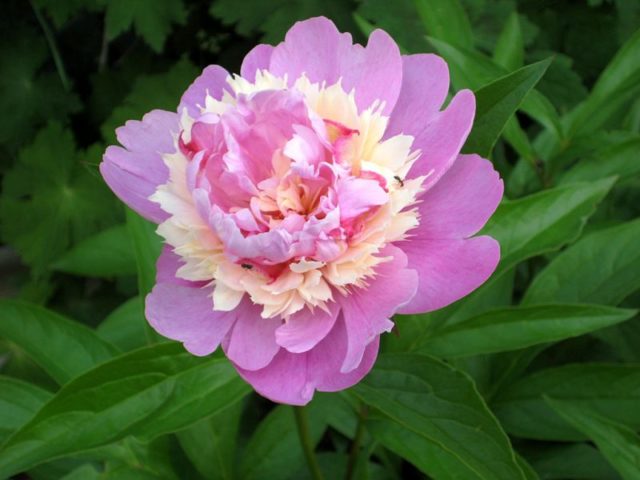
Peony Sorbet is easily recognized by the creamy layer in the middle part of the bud
Raspberry Sunday
The beautiful appearance of Raspberry Sundae attracts attention due to its unusual coloring. Peony flowers are soft pink in the lower part, there is a creamy layer in the middle, and at the top the petals become slightly crimson. The diameter of the buds reaches 18 cm, the bush itself can rise up to 70 cm. Flowering occurs around June 20.
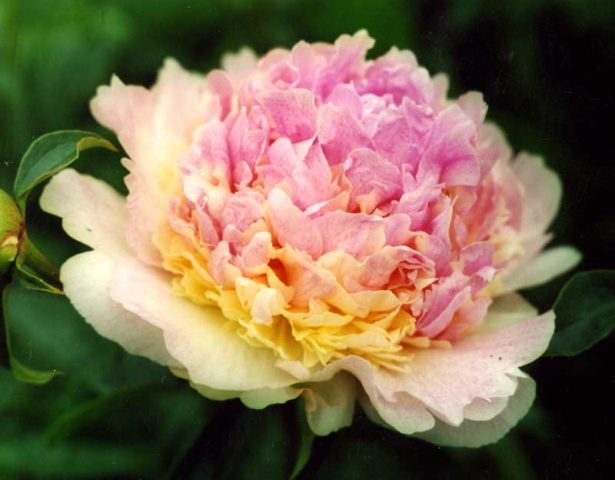
Raspberry Sunday buds are painted in several shades at once
Princess Margaret
The tall double peony Princess Margaret blooms in early June and usually rises 80 cm. The flowers of the variety are large, dark pink, with freely spaced petals.
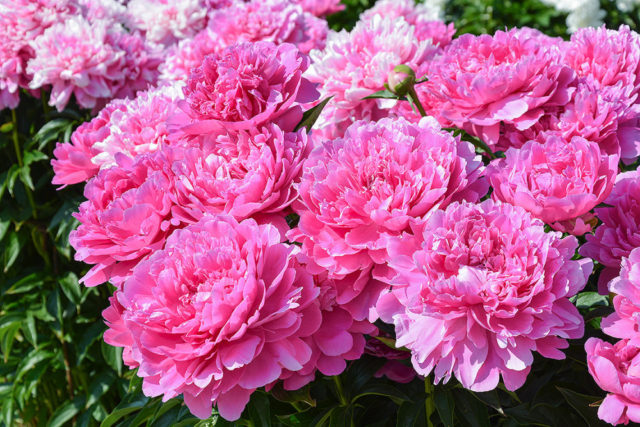
Despite the heavy flowers, the Princess Margarita variety does not need support
Pearl placer
Peony Zhemchuzhnaya Rossyp has a Japanese cup-shaped flower. Blooms in early summer, bearing pearly pink buds with bright yellowish staminodes in the center. It rises up to 80 cm, the stems of the variety are straight and stable, the leaves are rich green and small.
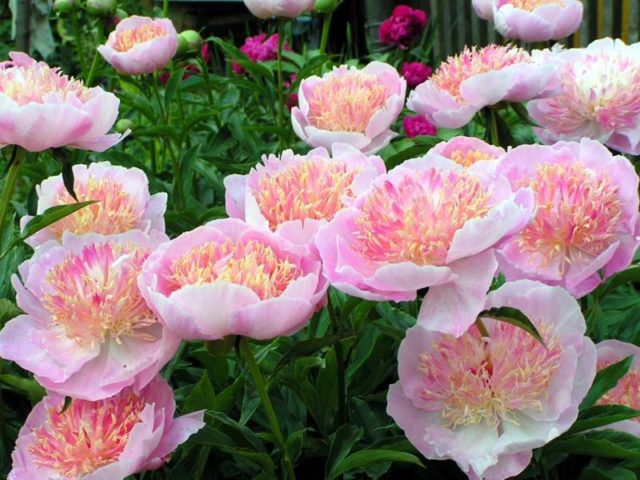
The main decorative effect of the Pearl scattering peony comes from the dense stamens in the center of the flower.
Nancy Nora
The Nancy Nora variety grows almost 1 m above the ground and after June 15 bears huge, densely double flowers of a soft pink hue. In the center the buds are lighter. Peony exudes a scent of freshness and looks very beautiful in sunny areas of the garden.
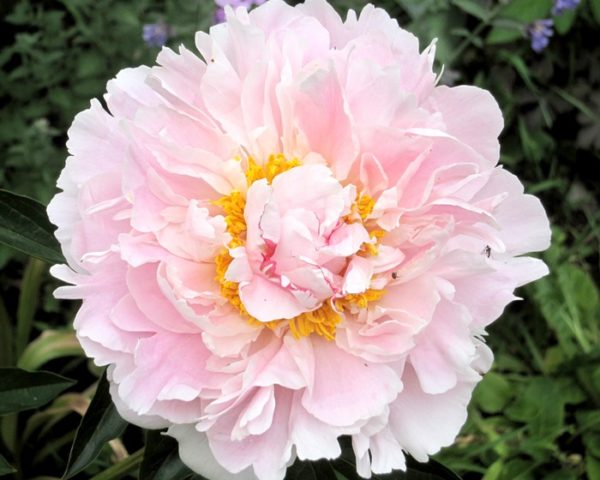
Pink peony Nancy Nora has good cutting resistance
Pink Delight
Light pink peony Pink Delight is distinguished by loose buds of a uniform delicate shade. In the center the flower is golden yellow due to numerous stamens. The height of the species usually does not exceed 70 cm; it begins to bloom profusely from the first days of June.
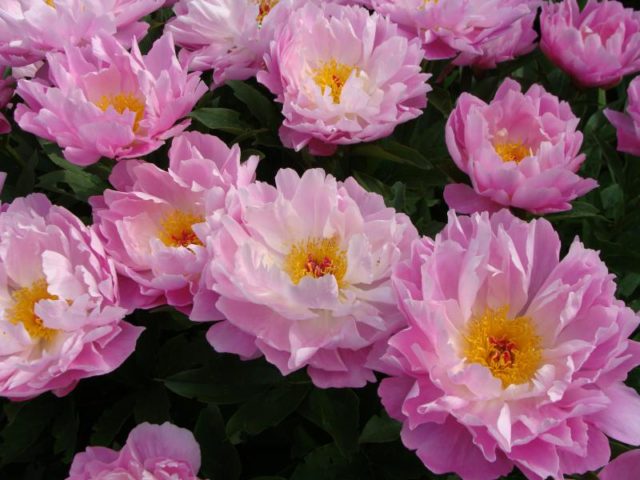
Pink Delight - a variety with cupped buds
Bowl of Beauty
The pink variety Bowl of Beauty blooms with huge buds up to 20 cm of a lilac hue. In the center of the cup-shaped flowers are “pom-poms” of long, pale yellow stamens. The variety reaches its maximum decorative value closer to July; it grows up to 90 cm above the ground.
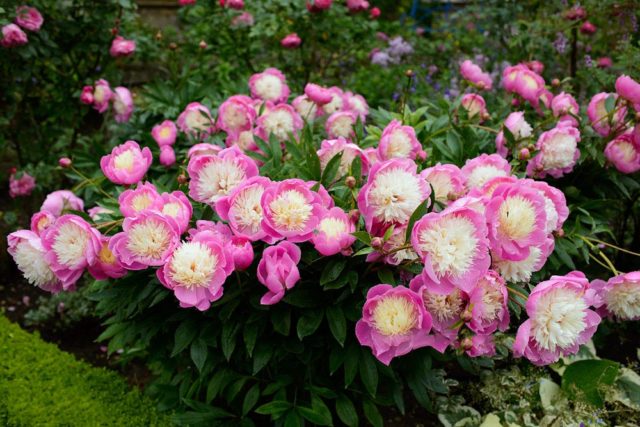
Bowl of Beauty is resistant to cold and disease
Pink peonies in landscape design
In garden design, peonies always play the role of a bright accent. Most often, these perennial flowers are planted in “front” areas, for example:
- in front of the porch of the house or on the sides of the main path;
Medium-sized and tall peonies beautifully frame the path in the garden
- next to garden arches and gazebos;
Thickets of peonies accentuate areas of the garden
- in large flower beds located in a well-lit area;
Peonies successfully decorate the space near fences in compound flower beds
- under the walls of the house - always where flowering bushes will be clearly visible.
Peonies look beautiful under the wall of the house and are also protected from the wind
Good neighbors for perennials are garden geranium and white tansy. The culture also goes well with lilies and asters, violets and catnips. But you shouldn’t plant roses nearby, they are too similar to pink peonies in flower structure, the plants will merge with each other.
Rules for planting and care
Beautiful perennials are unpretentious, so they can be grown in any garden, both in the middle zone and in Siberia. When choosing a location, you must take into account that the peony:
- grows well in sunny areas with light, permeable shade;
- prefers places protected from the wind;
- loves loamy soils with a pH level of up to 6.6.
Before planting the pink peony, the soil on the site is diluted with humus and peat, and sand is added for good drainage. A hole is dug about 60 cm deep, after which potassium-phosphorus fertilizers and prepared soil mixture are placed in it. The seedling is lowered into the hole, filled to the end and watered abundantly.

The hole for the peony should be 2-3 times larger than its roots.
Further care of the crop consists of regular watering as the soil dries. The perennial is fertilized three times per season - nitrogen is added in early spring, potassium and phosphorus are added at the beginning of flowering, and after wilting, it is fed again with potassium and superphosphate.
With the onset of autumn, pink peonies are pruned; this should be done in mid-October. A few centimeters of the stem with 3-4 leaves are left above the ground so that the plant sets replacement buds.Before the cold weather, the flowerbed with perennials is densely mulched with compost and peat, and covered with spruce branches on top if the winters in the region are cold.
Diseases and pests
Pink peony is quite resistant to diseases, but can suffer from the following fungi:
- botrytis;
Botrytis disease causes leaf drying and root rot
- powdery mildew;
Powdery mildew of a pink peony is easily recognized by a whitish coating on the leaves.
- gray mold.
When affected by gray mold, pink peony buds rot without blooming
Among the pests that pose a danger to crops are:
- root-knot nematodes;
It is almost impossible to cure the root-knot nematode; it destroys the roots of the pink peony
- bronze beetles;
The bronze beetle feeds on peony buds and can break flowers
- ants.
Ants eat the sweet juice of the buds and interfere with flowering
If fungal diseases occur, pink peonies are treated with copper sulfate or Fundazol, paying attention to both the leaves and the soil around the bush. Treatments are carried out three times with an interval of 10 days; if the treatment does not help, the perennial is removed from the site. In the fight against pests, the insecticides Karbofos and Actellik have a good effect, and in the early stages a soap solution may be sufficient.
Conclusion
Pink peonies decorate summer cottages in early and mid-summer. Among the numerous varieties you can find both dark and very light varieties of the crop, and even a novice gardener can handle the care.
